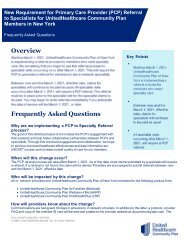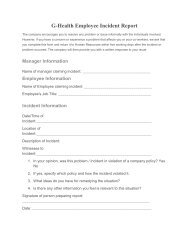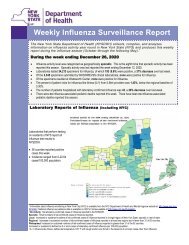Future of Health Care 2020
- No tags were found...
You also want an ePaper? Increase the reach of your titles
YUMPU automatically turns print PDFs into web optimized ePapers that Google loves.
THE FUTURE OF HEALTH CARE // BEHAVIORAL HEALTH<br />
DIAGNOSIS: MENTAL HEALTH ISSUES<br />
Covid-19 concerns just added to an<br />
Marie Story, corporate wellbeing consultant at Walsh Duffield Cos. Inc., says the stigma <strong>of</strong> mental illlness gets in the way <strong>of</strong> people receiving help.<br />
JOED VIERA<br />
BY ANNEMARIE FRANCZYK<br />
Contributing writer<br />
For employers reluctant to recognize<br />
the impact <strong>of</strong> depression, anxiety<br />
and stress among their workers, the<br />
Covid-19 pandemic might push them<br />
into full mental-health programming<br />
when the economy reopens.<br />
Companies must first embrace<br />
that mental health is affecting operations,<br />
and the increasing trends <strong>of</strong><br />
opioid addiction and suicide might<br />
force the issue. Some have seen rising<br />
use <strong>of</strong> their employee-assistance<br />
programs and employee claims data<br />
around mental-illness diagnoses and<br />
treatment.<br />
“They are being treated, and that’s<br />
a good thing,” said Marie Story, corporate<br />
wellbeing consultant at Walsh<br />
Duffield Cos. Inc. “There needs to be an<br />
extra step to create a culture, to make<br />
sure that the employers are supporting<br />
them.”<br />
But many employers are not doing<br />
so, Story said. For many, the stigma<br />
and the shame that come along with<br />
mental illness may be getting in the<br />
way. Ignoring problems only makes<br />
things worse.<br />
“Something that could be addressed<br />
simply and inexpensively festers and<br />
gets more difficult and expensive to<br />
treat,” said Kenneth Houseknecht,<br />
executive director <strong>of</strong> Mental <strong>Health</strong><br />
Advocates <strong>of</strong> Western New York.<br />
The value <strong>of</strong> an investment in mental<br />
health could be a motivation. For<br />
every dollar put into scaled-up treatment<br />
for common mental disorders,<br />
there is a return <strong>of</strong> four dollars<br />
in improved health and productivity,<br />
according to a May 2019 report by the<br />
World <strong>Health</strong> Organization.<br />
Recent statistics around that point<br />
to a severe level <strong>of</strong> workplace mental<br />
illness, pre-Covid-19.<br />
RRThree-quarters <strong>of</strong> workers<br />
reported suffering from work-related<br />
stress.<br />
RRA quarter <strong>of</strong> all workers indicated<br />
they are depressed.<br />
RRMore than half say anxiety and<br />
stress affect their work performance.<br />
It should not be a surprise that<br />
workforce surveys had indicated that<br />
most employees were interested in policies<br />
and procedures regarding mental<br />
health, Houseknecht said.<br />
“It’s been on everyone’s radar well<br />
before coronavirus,” Houseknecht<br />
said. “If we had a workforce already<br />
dealing with anxiety, depression and<br />
stress, this is just going to accelerate<br />
and exacerbate it. There will be<br />
even greater urgency and immediacy<br />
to address the mental illness in the<br />
workplace.<br />
“Employers: Will you be anticipatory<br />
and take a positive approach and<br />
take a productive approach and create<br />
a mental-health culture, or will you<br />
just deal with issues as they come up?”<br />
Lindsay Herndon, BryLin Behavioral<br />
<strong>Health</strong> System’s director <strong>of</strong> outpatient<br />
services, said an organization’s<br />
leadership should be intent on becoming<br />
aware <strong>of</strong> how employees are functioning<br />
in the workplace.<br />
“The way you treat your staff, the<br />
more willing they will be to take on<br />
extra duties,” she said. “If they’re there<br />
just there to get a paycheck, they’re not<br />
going to be productive.”<br />
Communication can stem the problems<br />
that can lead to mental distress,<br />
Herndon said.<br />
“In the workplace, you get rumors<br />
that fly around, like ‘Oh my god, are<br />
they talking about me? Is my paycheck<br />
safe?’ That’s when mental-health<br />
problems break in,” Herndon said.<br />
To jump ahead <strong>of</strong> potential problems,<br />
BryLin engaged in two communication-focused<br />
initiatives to help<br />
administrators open the lines with<br />
staff.<br />
One was a survey that asked<br />
employees to rate workplace environ-<br />
24 THE FUTURE OF HEALTH CARE BUFFALO BUSINESS FIRST


















